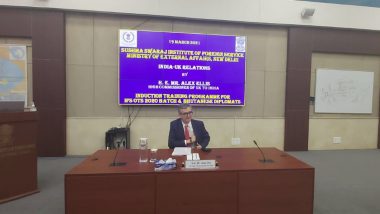London, March 19: UK Prime Minister Boris Johnson's scheduled visit to India at the end of the next month promises to be a very significant marking of a new kind of relationship across trade and investment as well as the exchange of people and ideas between India and the UK, British High Commissioner to India Alex Ellis said on Friday.
The envoy, who is in charge of finalising the prime ministerial visit agenda, highlighted several pillars of focus for the bilateral engagement, covering areas such as defence and security and climate action and healthcare, including cooperation in the area of COVID-19 vaccines.
“This is the first major bilateral visit that this Prime Minister would have made to any country outside the UK, that says quite a lot about the significance of the India relationship which he seeks,” said Ellis, addressing a PTI question on the visit during a virtual seminar organised by the London-based think tank International Institute for Strategic Studies (IISS). US President Joe Biden Orders Flags to Be Flown at Half-Staff in Honor of Atlanta Shooting Victims.
“It is very exciting that he is coming. He was planning to come in January, but the Covid situation in the UK put paid to that, but he is very keen to come and we are really looking forward to what we hope will be a very significant marking of a new kind of relationship,” he said.
Addressing the seminar entitled ‘The UK's Integrated Review: impact on relations with India', the senior diplomat who had been involved with the formulation of the Integrated Review released earlier this week noted that on major global issues such as climate change there can be “no solution without India”.
“This visit should have the various pillars: It has to have a defence and security part, given the high degree of trust around how we work together; global issues of climate and health, of which vaccines no doubt will be a part; trade and investment, including a new trading relationship; but also the flow of people and ideas and technology between our two countries and how we deal with that in the world more generally, I think will be the essential elements of this visit,” he added.
The Integrated Review, a comprehensive realignment of the UK's foreign policy outlook in a post-Brexit era, had highlighted an Indo-Pacific tilt. Lord Jo Johnson, the UK Prime Minister's younger brother, noted that the details of such a tilt will be fleshed out during Boris Johnson's visit in April.
As a member of the delegation during the last India visit by former UK Prime Minister Theresa May, the former minister pointed out that while that tour “marked something of a low point in terms of bilateral relations”, things are going to get a lot better fast with the upcoming visit. “The real meat in the new approach to the region and to India will probably become concrete during the Prime Minister's visit next month,” said Lord Johnson.
“This is a really important visit in the UK context. We haven't had a big bilateral visit for a couple of years, and this is certainly the first by this Prime Minister. The fact that he's chosen India underlines the centrality that India has in the new conception of the Indo-Pacific region's importance,” he said.
The conclusion of an Enhanced Trade Partnership (ETP), as a precursor to a free trade agreement (FTA), is on top of the agenda for when Boris Johnson meets Prime Minister Narendra Modi in April.
“Prime Minister Boris Johnson's visit to India next month is the first major step in the implementation of the UK's Integrated Review's objective of ‘transforming' cooperation with India,” said Rahul Roy-Chaudhury, Senior Fellow for South Asia at IISS, who chaired the seminar on Friday. Thailand to Reduce Mandatory Quarantine Period For Arrivals to 10 Days.
“A trade agreement and a 10-year bilateral ‘roadmap' are to be signed and defence cooperation strengthened with a defence logistics MoU. This will also symbolise his first visit to the Indo-Pacific, visibly demonstrating the UK's ‘tilt' to the region, with India being recognised as an ‘international actor of growing importance',” he said.
The strategic expert also pointed out that while the ‘Integrated Review' simply outlines a framework for the so-called Indo-Pacific “tilt”, the focus must now be on developing and expanding on it as a full-fledged policy towards the region, as other European countries such as France, Germany and the Netherlands have already done.
(The above story is verified and authored by Press Trust of India (PTI) staff. PTI, India’s premier news agency, employs more than 400 journalists and 500 stringers to cover almost every district and small town in India.. The views appearing in the above post do not reflect the opinions of LatestLY)













 Quickly
Quickly


